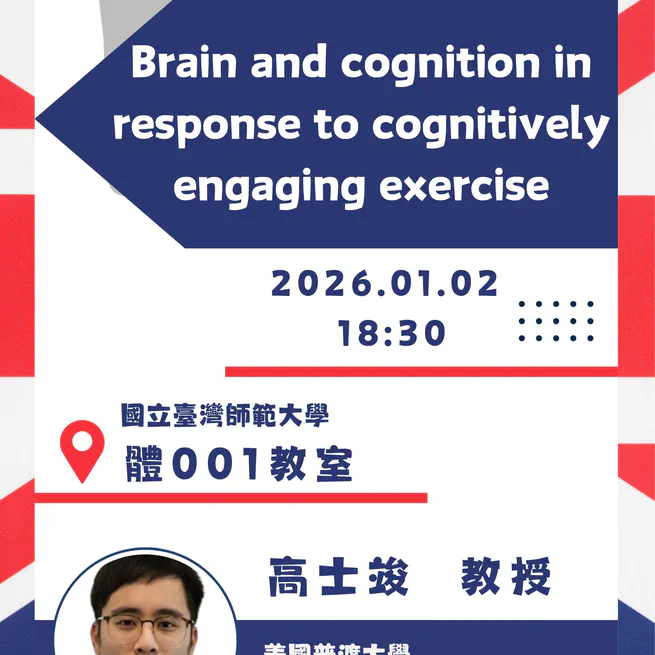
高教授在演講中不僅分享了關於認知參與型運動與大腦健康的最新研究,更無私地傳授了他在美國學術界的實務經驗,包括研究計畫申請(Grantsmanship)的關鍵要素以及大學教職面試的選拔準則。他強調了研究重要性(Significance)、嚴謹性(Rigor)與可行性(Feasibility)的結合,並提醒我們學術之路除了實力,也需要持續的熱情與謙卑。這場國際交流讓我深刻感受到,一位卓越的學者不僅要在專業領域拔尖,更要具備引領後輩的人文關懷與傳承精神。 During the lecture, Professor Kao not only shared cutting-edge findings on cognitively engaging exercise and brain health but also generously offered his practical wisdom regarding the American academic landscape. He detailed the essential components of successful grantsmanship and the rigorous criteria used in faculty hiring processes. Emphasizing the trifecta of research significance, rigor, and feasibility, he reminded us that an academic career requires a balance of professional excellence, enduring passion, and intellectual humility. This international exchange underscored that a truly great scholar excels not only in their specialized domain but also in their commitment to mentoring and fostering the next generation of researchers.
Jan 3, 2026

征矢教授在演講中梳理了他數十年來在運動生物化學、神經生物學及運動大腦科學領域的尖端研究脈絡。他特別強調了運動、精準營養與神經健康之間的動態互動,並展示了如何將實驗室中的基礎神經機制研究,轉譯應用於人類認知表現的優化策略中。演講中提到關於『大腦表現的機制』與『補充劑對認知的影響』,與我目前關注的急性運動介入研究有著高度的契合。此次交流不僅深化了我對運動引發大腦適應機制的理解,更讓我領悟到跨學科整合(Exercise, Nutrition, and Brain Health)在推動現代精準運動科學中的戰略意義。這不僅是學術知識的增進,更是對一位傑出學者嚴謹治學態度的深刻體察。 Professor Soya meticulously outlined his decades of pioneering research across exercise biochemistry, neurobiology, and sports neuroscience. He emphasized the dynamic interplay between physical activity, precision nutrition, and neurological health, demonstrating the rigorous process of translating fundamental neural mechanisms into practical strategies for optimizing human cognition. His insights regarding 'Brain mechanisms of human performance' and the 'Cognitive effects of dietary supplements' resonate deeply with my current research focus on acute exercise interventions. This exchange not only deepened my comprehension of exercise-induced cerebral adaptations but also underscored the strategic importance of interdisciplinary integration—encompassing exercise, nutrition, and brain health—in advancing the frontiers of precision sports science. Beyond the academic gain, it was an inspiring encounter with the intellectual rigor and dedication of a world-class scholar.
Dec 24, 2025
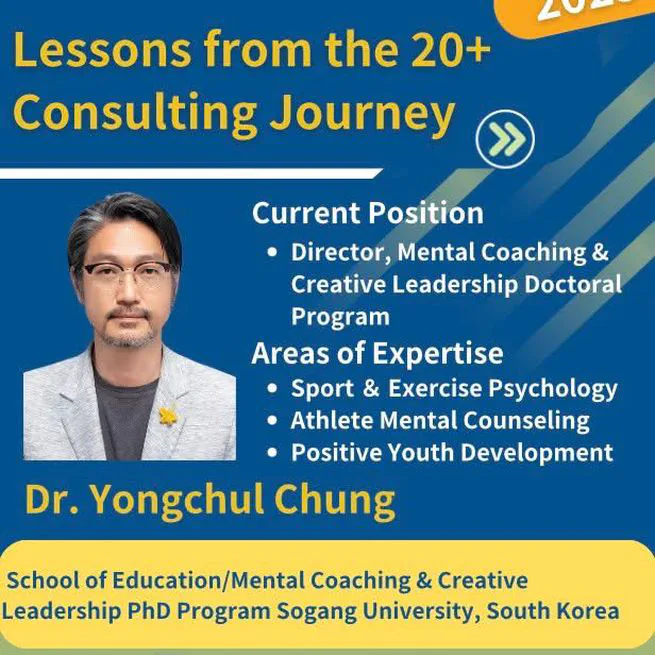
Chung 教授在演講中總結了八項核心建議,包括:1. 志存高遠(Shooting for the star);2. 不為速成而妥協(Do not compromise with a quick fix);3. 保持謙卑(Be humble);4. 持續傾聽(Listen, listen, and listen);5. 建立並適時打破常規(Make a firm rule and break it);6. 善用幽默感;7. 生命遠大於奧運(Life is bigger than the Olympics);8. 深呼吸並享受當下。這些洞見提醒我們,運動科學研究不應僅限於數據,更應具備濃厚的人文關懷。 During the lecture, Professor Chung summarized eight core lessons: 1. Shooting for the star; 2. Do not compromise with a quick fix; 3. Be humble; 4. Listen, listen, and listen; 5. Make a firm rule and break it; 6. Use humor whenever you can; 7. Life is bigger than the Olympics; 8. Take a deep breath and enjoy the present moment. These insights serve as a powerful reminder that sports science research should transcend mere data and be rooted in profound humanistic care.
Nov 6, 2025
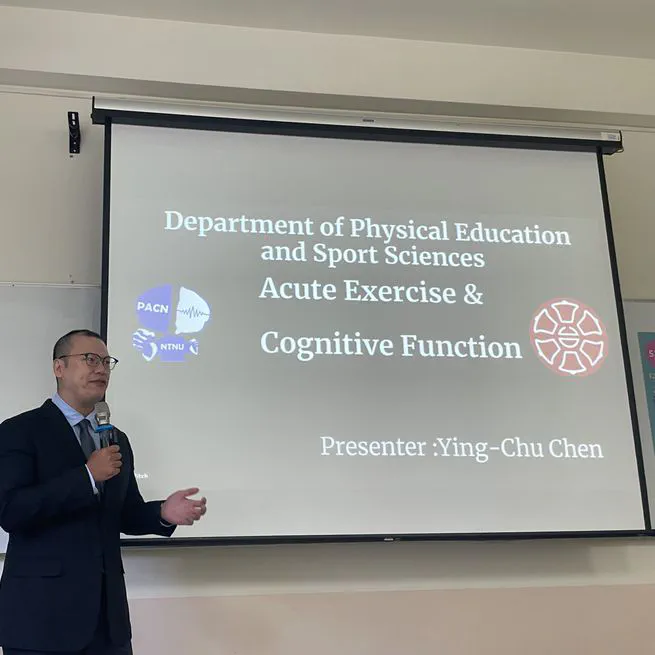
In the course demonstration session led by Steve Ying-Chu Chen, he showcased his extensive teaching experience and demonstrated how flexible bilingual strategies in EMI (English as a Medium of Instruction) can help students engage more effectively in fields like exercise science and cognitive neuroscience. By using translanguaging, students are able to draw on their full linguistic resources to deepen their understanding and express complex ideas, while also enhancing their academic English skills.Ying-Chu Chen emphasized that bilingual teaching is not just about switching between languages; it's a powerful tool for promoting educational equity and global competence. When students are taught in a multilingual environment, they can develop a broader perspective, critical thinking skills, and a stronger connection to global knowledge.The seminar also addressed the growing importance of language equity in higher education, stressing that EMI should aim to lower language barriers so that students from diverse linguistic backgrounds can equally participate, understand, and express themselves. By balancing language use with content delivery, instructors can create a more inclusive learning environment that is both academically rigorous and accessible. Additionally, the seminar explored the future of bilingual collaboration in teaching, offering practical strategies and insights to help educators find the balance between theory and practice in EMI classrooms. Overall, the event not only showcased the diversity of bilingual education but also prompted attendees to think about how to continue advancing language inclusion and academic innovation in globalized education.
Oct 17, 2025
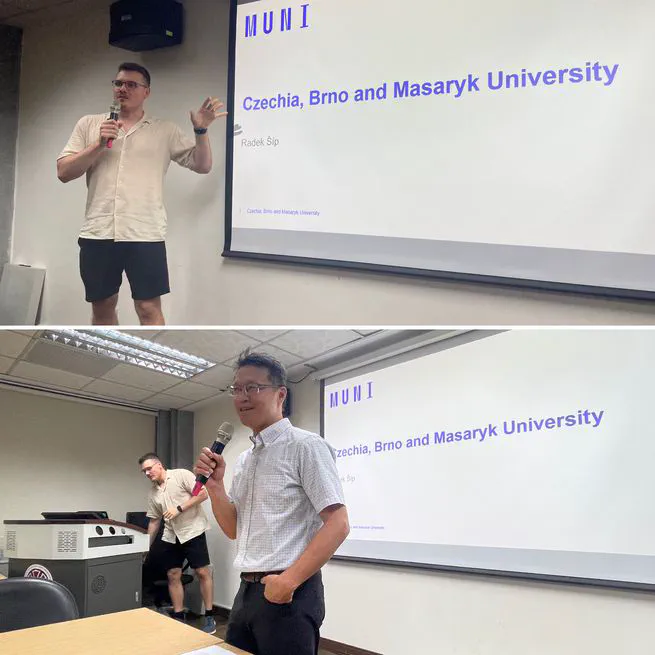
這週的讀書會活動可說是內容豐富、緊湊充實。首先,我們一同聆聽曉靈學姊的口試預報,與會的夥伴們熱烈參與討論,積極給予建設性的回饋,讓學姊能夠更加完善她的報告內容。接著,在育愷老師的安排下,辰歆學長帶領大家實際操作最新的文獻計量分析工具「CiteSpace」,讓實驗室成員在資料分析與研究視野上都能再進一步。最後,我們有幸邀請來自捷克的交換學者 Radeck Sip 博士與我們交流,他不僅介紹捷克與 Brno Masaryk University 的歷史與特色,也讓我們反思:當我們面對國際友人時,是否也具備足夠的能力向他人介紹我們的文化與家鄉。這樣多元且充實的行程,不僅拓展了研究技能,也激發我們對跨文化交流的省思。 This week’s reading group schedule was exceptionally enriching and dynamic. We began by attending senior student Xiaoling’s mock oral defense, during which all participants actively engaged in providing constructive feedback to help her refine and strengthen her presentation. Following that, under the guidance of Professor Yukai, senior student Chen-Hsin introduced us to the latest bibliometric analysis tool, CiteSpace, offering hands-on experience that significantly enhanced our analytical capabilities and research literacy. The session culminated in a special visit from Dr. Radeck Sip, an exchange scholar from the Czech Republic, who offered an insightful introduction to the history and academic landscape of both his country and Brno’s Masaryk University. His sharing broadened our global perspective and also prompted reflection: are we equally equipped to articulate and share our own cultural heritage with the international community? This multifaceted experience not only expanded our research skillset but also deepened our appreciation for intercultural dialogue.
Jul 17, 2025
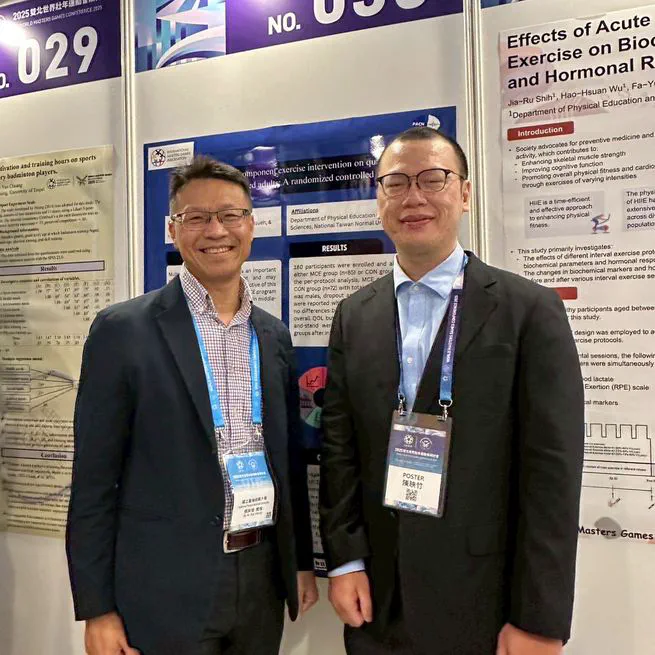
The World Master Games Conference 2025 invites professionals across the globe to explore the future of sustainable, data-driven, and inclusive sports. This two-day event includes keynote speeches, panels, workshops, and networking activities, with a focus on aligning with the UN SDGs through six thematic tracks. In this seminar, Ying-Chu Chen shared recent research on the effects of a multi-component exercise intervention on quality of life in middle-aged adults: a randomized controlled trial.
May 24, 2025
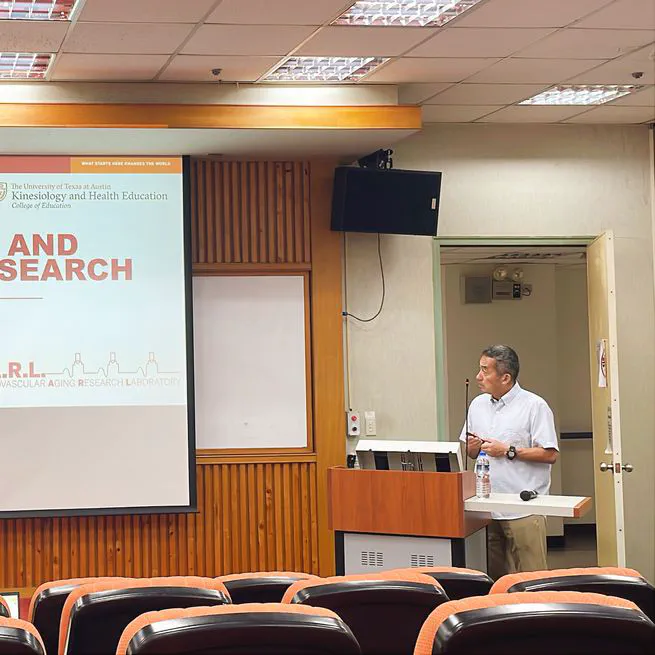
One of the most impactful messages from his talk was the emphasis on resilience and long-term vision in an academic career. Professor Tanaka did not shy away from highlighting the challenges—uncertainty, funding pressure, and the occasional failure. Yet, he encouraged us to stay committed to asking meaningful questions and pursuing research that contributes to the well-being of society, especially in fields like cardiovascular health and aging.His own journey, from early research interests to founding the Cardiovascular Aging Research Laboratory (C.A.R.L.), demonstrated how a focused research niche can evolve into a globally recognized academic identity. This point struck me deeply, especially as a graduate student still shaping my own research trajectory in exercise science.As someone who hopes to bridge exercise science and cognitive health, I found Professor Tanaka’s discussion of interdisciplinary collaboration particularly motivating. He reminded us that impactful science often arises at the intersection of disciplines and that curiosity must always guide our scholarly path. Moreover, his humble demeanor and willingness to share practical advice—such as maintaining a consistent publication rhythm, nurturing academic networks, and mentoring students—offered not just abstract ideals, but concrete steps we can take. This seminar made me reflect critically on my own career goals. Am I positioning myself to make a long-term impact? Am I choosing research questions that I deeply care about? These are not easy questions, but the talk provided a framework to begin answering them Ultimately, Professor Tanaka’s visit
May 8, 2025
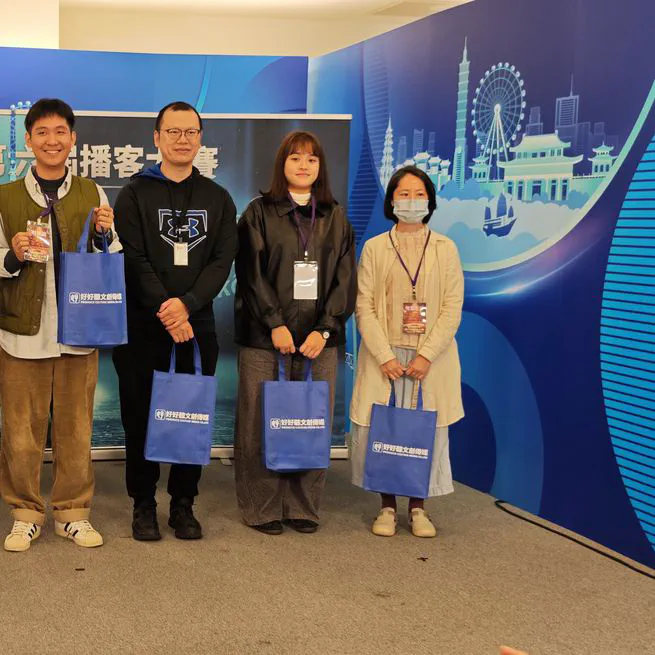
One of the most impactful takeaways from Professor Brazaitis’ lecture was the reconceptualization of stress as a biologically essential process rather than an inherently negative experience. Through compelling physiological models and real-world examples, he emphasized that controlled stress exposure can trigger beneficial neuroendocrine adaptations, improve cognitive function, and enhance physical resilience. As someone conducting research on acute exercise and cognitive performance, I found his interdisciplinary approach highly relevant and invigorating. The lecture prompted me to reflect on how we can design interventions that harness stress adaptively rather than merely avoiding it. His message was not only scientific but also empowering: stress, when well understood, can be an ally in optimizing health.
Apr 21, 2025
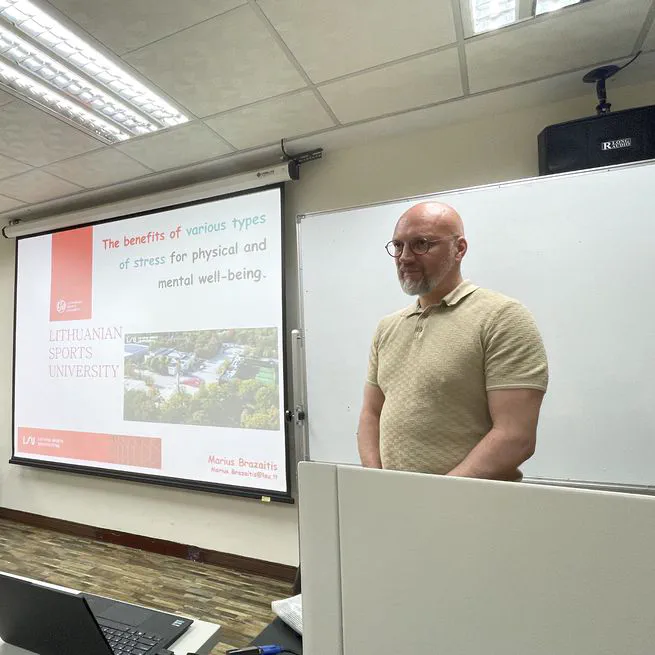
One of the most impactful takeaways from Professor Brazaitis’ lecture was the reconceptualization of stress as a biologically essential process rather than an inherently negative experience. Through compelling physiological models and real-world examples, he emphasized that controlled stress exposure can trigger beneficial neuroendocrine adaptations, improve cognitive function, and enhance physical resilience. As someone conducting research on acute exercise and cognitive performance, I found his interdisciplinary approach highly relevant and invigorating. The lecture prompted me to reflect on how we can design interventions that harness stress adaptively rather than merely avoiding it. His message was not only scientific but also empowering: stress, when well understood, can be an ally in optimizing health.
Apr 21, 2025